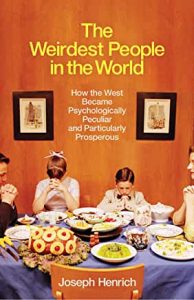I’ve been slowly reading The Weirdest People in the World by Joseph Henrich. Slowly because I’ve dipped into a reading group and that gave me an excuse to dawdle. And also because it’s one of those too-heavy-to-lift books that need an arrangement of cushions to read. Perhaps it’s because of this dilatory pace that I found myself decreasingly impressed by the book as I went on.
Or perhaps it’s because the freshest part of the argument is in the early sections, which document the different responses to psychology experiments from different kinds of people around the world and make the argument about the origins of the unusual ‘western’ psychology lying in the mediaeval Church’s prohibitions on kin marriage. Henrich callis it the ‘Marriage and Family Programme’, although doesn’t really explain where it came from. For those still unaware of the acronym, ‘weird’ stands for ‘western, educated, industrialised, rich and democratic’. The book’s accumulation of evidence that there is a distinctive ‘weird’ psychology, correlated with the footprint of western Christianity, is reasonably persuasive – although it is far from obvious to me that an accumulation of individual experimental results and survey correlations of this kind amounts to decisive evidence. Many chapters are a list of: here’s one study in place X; here’s another at another time in place Y; then Z; and here are some scatter plots with regression lines.
The trouble is that the book then dissolves into a less convincing argument that this attitude to kin marriage – which drove people in the west to look for social relations and build trust outside their immediate clan – explains everything. My firm view is that history is over-determined and nothing has only one cause. As the chapters went by, the book more and more seems to be an amalgam of all those other Big Histories such as Guns, Germs and Steel, or Why the West Rules for Now. Inevitably, it has to engage with feedback loops. Having said that, highlighting the feedback loop between psychology and institutional change is interesting and productive.
And oh yes, one last point. There’s the implicit teleological determinism in Weirdest. It always refers to “development” in inverted commas, but there is a value judgment; the west has progressed more than the rest. Cast the argument forward and it’s another matter: will the west stay democratic and prosperous? Aren’t there worrying signs of family dynasties in the US and jobs (only) for mates in the UK (couldn’t one see Eton and Oxbridge as tribal?). Yet this sits oddly with the book’s avoidance of any explicit normative discussion. Is weird good? If it really does correlate with prosperous, surely yes? As a WEIRD person, I htink so.
I think it’s well worth a read, there’s plenty of food for thought and economics tends to underplay psychology and culture. But maybe wait for the paperback.

